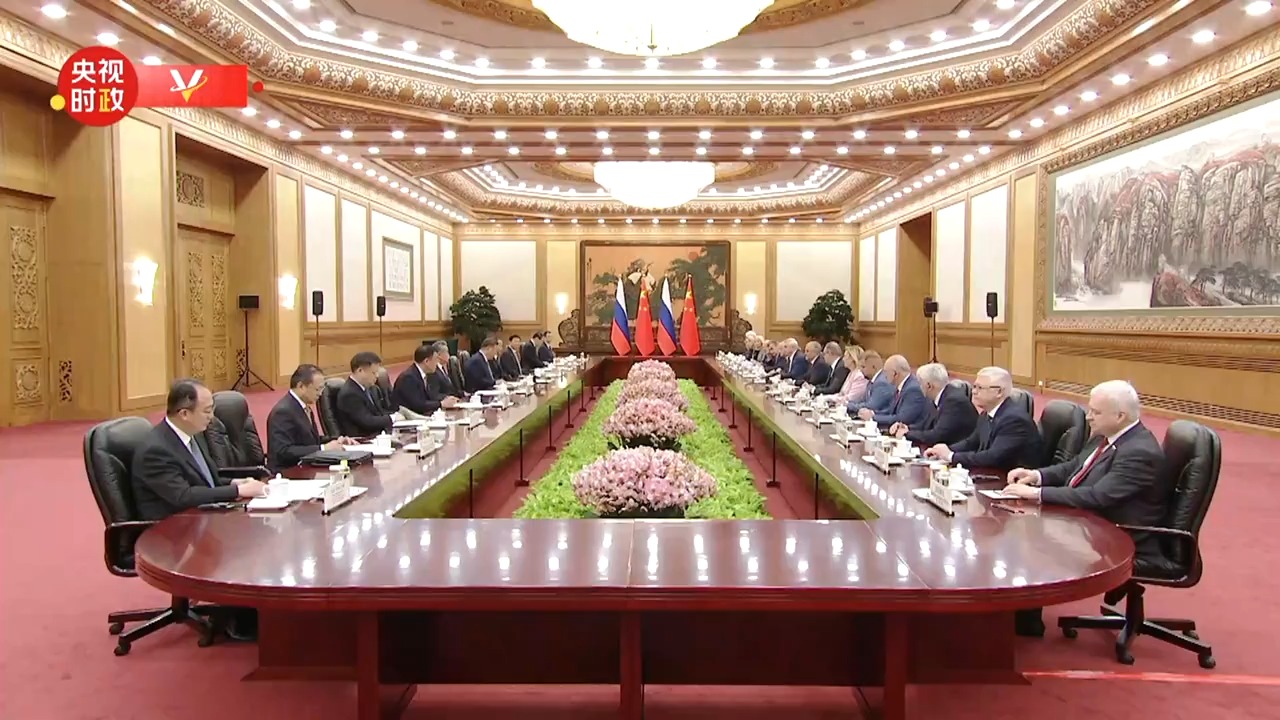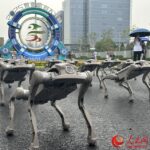On the morning of August 26, President Xi Jinping met with Chairman of the Russian State Duma Vyacheslav Volodin at the Great Hall of the People in Beijing.
Xi Jinping pointed out that in May of this year, he paid a state visit to Russia and attended the 80th anniversary commemoration of the victory in the Great Patriotic War of the Soviet Union. Next week, China will solemnly hold events to commemorate the 80th anniversary of the victory in the Chinese People’s War of Resistance Against Japanese Aggression and the World Anti-Fascist War. China and the Soviet Union, as the main battlefields in Asia and Europe during World War II, made enormous national sacrifices to resist Japanese militarism and German fascist aggression, and they made significant contributions to winning the victory in World War II. Both sides should carry forward their traditional friendship, deepen strategic mutual trust, strengthen exchanges and cooperation in various fields, jointly safeguard the security and development interests of the two countries, unite with global South countries, uphold true multilateralism, and promote the development of the international order in a more just and reasonable direction.
Volodin said: “Respected President Xi Jinping, the relationship between our two countries is largely due to the work of you and President Putin. As for the parliamentary level, we will ensure that the decisions made at the level of heads of state are legislatively guaranteed. I would like to point out that on the occasion of the 80th anniversary of the victory in the World Anti-Fascist War, because this is our common victory, we commemorate this day together with the Chinese people.”
Great Hall of the People
The Great Hall of the People is a state building located on the western edge of Tiananmen Square in Beijing. It was constructed in 1959 and serves as the meeting place for China’s national legislature and for numerous political and diplomatic events. The hall is a significant symbol of the People’s Republic of China and its Communist Party.
Beijing
Beijing is the capital of China and a major cultural hub with a history spanning over 3,000 years. It served as the seat of power for several dynasties, most notably the Ming and Qing, which left behind profound landmarks like the Forbidden City and the Temple of Heaven. Today, it is a vast modern metropolis that blends ancient imperial heritage with contemporary global influence.
Russia
Russia is a vast transcontinental nation with a rich history spanning over a millennium, from the medieval state of Kievan Rus’ to the powerful Russian Empire and later the Soviet Union. Its cultural landscape is defined by grand landmarks like the Kremlin and St. Basil’s Cathedral in Moscow, which reflect its deep historical roots and complex political evolution.
Soviet Union
The Soviet Union was a socialist federal state that existed from 1922 to 1991, formed after the Russian Revolution. It was a one-party state governed by the Communist Party and became a global superpower, engaging in the Cold War with the United States. The union dissolved in 1991, fracturing into 15 independent post-Soviet states.
Great Patriotic War
The Great Patriotic War is the term used in Russia and other former Soviet states for the period of World War II from 1941 to 1945, specifically referring to the war against Nazi Germany. It began with Germany’s invasion of the Soviet Union (Operation Barbarossa) and culminated in the Soviet capture of Berlin. The conflict is a central element of national identity, remembered for immense sacrifice and its pivotal role in defeating Nazi Germany.
Chinese People’s War of Resistance Against Japanese Aggression
The Chinese People’s War of Resistance Against Japanese Aggression refers to China’s prolonged military conflict against Japan, which began with the Marco Polo Bridge Incident in 1937 and lasted until Japan’s surrender in 1945. It was a major theatre of World War II, resulting in immense Chinese casualties and widespread devastation. This period is a foundational element of modern Chinese historical identity, symbolizing national resilience and sacrifice.
World Anti-Fascist War
The World Anti-Fascist War, more commonly known as World War II, was a global conflict from 1939 to 1945 between the Allied powers and the Axis powers. It was a monumental struggle against fascist aggression and expansionism, resulting in profound geopolitical changes and the establishment of the United Nations to promote international peace and security.
World War II
World War II was a global conflict that lasted from 1939 to 1945, involving most of the world’s nations. It was sparked by the aggressive expansionist policies of Nazi Germany, Imperial Japan, and Fascist Italy, and resulted in an unprecedented scale of destruction and the Holocaust. The war concluded with the Allied victory, leading to a new world order and the establishment of the United Nations.


